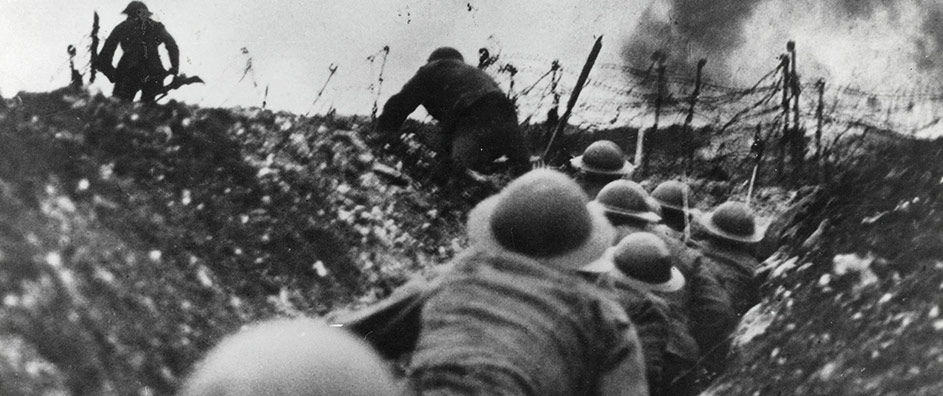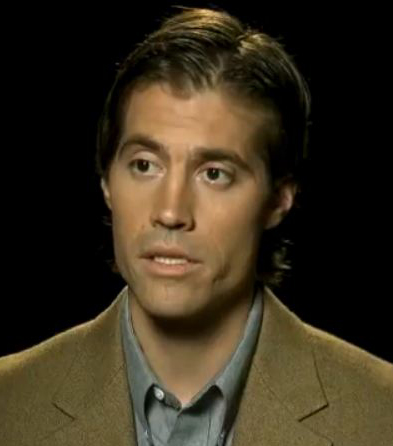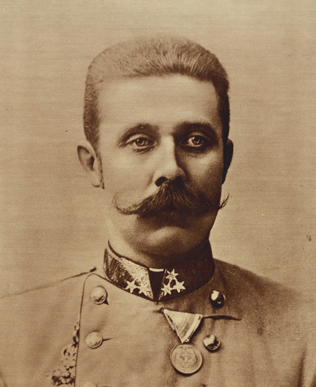The views expressed in our content reflect individual perspectives and do not represent the authoritative views of the Baha'i Faith.
The beheading of journalist James Foley by his ISIS captors shockingly reminds us of the brutality of terrorists bent on achieving a political agenda. As the news ripples across the planet, engendering outrage and horror, we need to carefully ponder the potential of such horrific and violent acts to dramatically alter our destinies.
Exactly a century ago, in August of 1914, war on the European continent erupted. The catalyst: the assassination of Archduke Francis Ferdinand, heir to the Austro-Hungarian Empire, on June 28, 1914 by Serbian nationalists–whose political agenda involved compelling the empire to concede its Slavic provinces to form Yugoslavia. This sobering yet senseless event carried out by a group of Serbian assassins in Sarajevo quickly spread out of control, after the empire made unreasonable demands on tiny Serbia, and European countries set about mobilizing their armies.
Within five weeks of the Archduke’s assassination, the Austro-Hungarian and German Empires had aligned themselves against the French Third Republic, the United Kingdom of Great Britain and Ireland, and the Russian Empire. Other countries, including the United States, would later join the belligerents as the war spread across the globe.
Armed with machine guns, long-range cannon, submarines, poison gas, air power and dreadnaughts, the participating nations over-confidently believed their side would win a quick victory. Enthusiastic to do battle, young men emptied out towns and villages to serve their countries in what would ironically come to be known as “The Great War.”
In his travels to America in 1912, Abdu’l-Baha warned audiences, political leaders and diplomats that Europe was slipping recklessly toward war. In Canada he said:
All Europe is an armed camp. These warlike preparations will necessarily culminate in a great war. The very armaments themselves are productive of war. This great arsenal must go ablaze. There is nothing of the nature of prophecy about such a view. It is based on reasoning solely. – Abdu’l-Baha in Canada, p. 51
Amazingly, the antagonists of three contending countries were related. The Czar of Russia, Kaiser Wilhelm II of Germany, and George V of England were among Queen Victoria’s royal grandchildren, and therefore first cousins. Exercising decisive political power, these crowned heads carried on intimate correspondence and vacationed each year at one another’s castles. Between them systems of international cooperation in banking, transportation and communication, as well as peace initiatives taken with Hague Conventions of 1899 and 1907, appeared to secure a firm foundation for peace between them.
On the eve of the conflict, Germany was the second most industrialized country in the world. The British Empire had spread across the globe. And the international peace movement was gaining the support of such influential personalities as the Russian Czar.
Yet underneath the panacea of economic prosperity and cooperation among the European nations, subject peoples of the Romanov, Hapsburg and Ottoman empires agitated for independence from ramshackle, unjust systems of government.
The horrors of this “Great War” thrust 60 million men into infernos of armed conflicts, slaughtering 8 million of them, permanently disabling 10 million, wiping out a substantial portion of European wealth, overthrowing the German, Hapsburg, Russian, and Ottoman Empires, undermining the hegemony of the British Empire, bankrupting the German nation, and paving the way for the emergence of totalitarian regimes–and another more horrific world war that would begin in 1939. An unprecedented disaster for the entire planet, a slaughterhouse of unimaginable proportions, World War I set the course for the deaths of fifty million people in World War II.
Lamenting the ignorance and folly of peoples agitating for war, Abdu’l-Baha said:
…human ferocity proceeds from selfishness, greed and oppression. It springs from no natural necessity. Man needlessly kills a thousand fellow creatures, becomes a hero and is glorified through centuries of posterity. A great city is destroyed in one day by a commanding general. How ignorant, how inconsistent is humankind! If a man slays another man, we brand him as a murderer and criminal and sentence him to capital punishment, but if he kills one hundred thousand men, he is a military genius, a great celebrity, a Napoleon idolized by his nation. If a man steals one dollar, he is called a thief and put into prison; if he rapes and pillages an innocent country by military invasion, he is crowned a hero. – The Promulgation of Universal Peace, p. 102.
When I lived in Portugal and France, I saw many stone memorials to the fallen soldiers of the First World War erected in villages and towns. Most were ill-kept and deteriorating with the passing of a century, and the consequent passing of those fathers and mothers who mourned the deaths of their dear sons. A haunting testimony to a conflict that wrought so much death, destruction and upheaval, these memorials barely intrude on the consciousness of the present generation – a generation that would do well to ponder whether the decapitation of James Foley is another isolated incident in some distant conflict, or else a portent hurtling humankind toward another global conflagration.
Unless we build world unity and a lasting peace among nations, the Baha’i teachings warn, humanity will continue to face terrorism, conflagration and war:
The well-being of mankind, its peace and security, are unattainable unless and until its unity is firmly established. – Baha’u’llah, Gleanings from the Writings of Baha’u’llah, p. 286.


















Comments
Sign in or create an account
Continue with Googleor